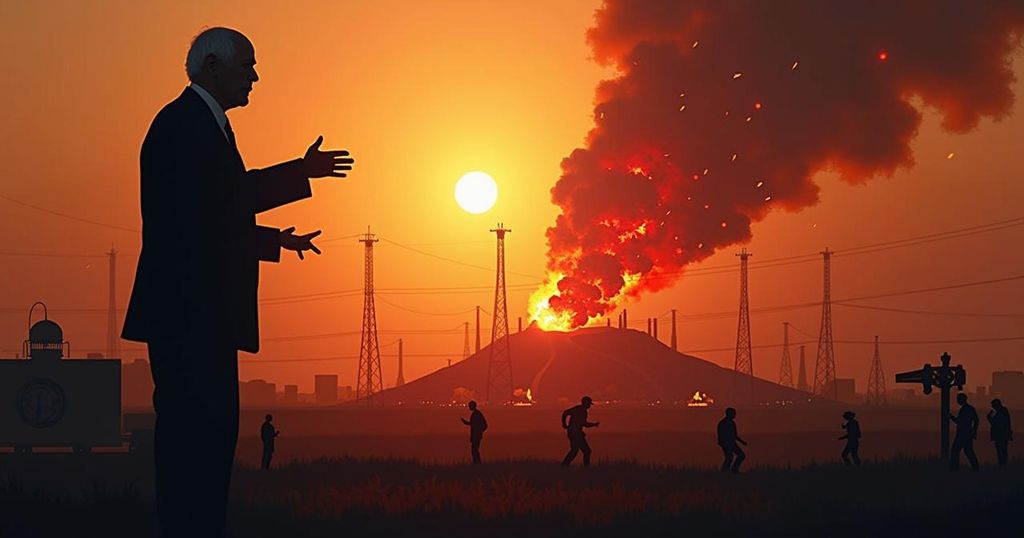President Biden has opposed any Israeli strikes on Iran’s nuclear facilities following Iran’s missile attack on Israel, asserting that any Israeli retaliation must be proportional. This position aligns with G7 nations and follows a heightened risk of conflict amid increasing tensions in the region following Iran’s missile barrage and Israel’s counter threats.
President Joe Biden has clearly stated his opposition to any potential Israeli strikes against Iran’s nuclear facilities in the wake of a recent missile attack on Israel by Iran. During a press conference on Wednesday, when asked if he would support such military retaliation, Biden firmly replied, “the answer is no.” This statement followed Iran’s launch of approximately 180 ballistic missiles targeting Israel, marking the second such assault since April. Despite Prime Minister Benjamin Netanyahu’s declaration that Iran would “pay” for the strike, there were no serious casualties reported in Israel, although one Palestinian in the occupied West Bank was killed. Approximately, some analysts have expressed concerns that Israel might take advantage of the situation to conduct operations against Iran’s nuclear capabilities. Ali Vaez, an expert at the International Crisis Group, warned of an increased likelihood of an Israeli offensive as Iran’s regional defense strength, particularly that of Hezbollah, appears waning. In a post on X, former Prime Minister Naftali Bennett urged an immediate attack on Iran’s nuclear program, asserting that “We have the justification. We have the tools.” However, President Biden has called for a measured approach, indicating that the United States remains “fully supportive of Israel,” while also emphasizing that any response from Israel should be “proportional.” This sentiment reflects a consensus among G7 nations, including Canada, France, Germany, Italy, Japan, and the United Kingdom. The Biden administration, along with G7 leaders, has also discussed the possibility of imposing new sanctions against Iran in response to its recent actions. The Iranian missile attack was portrayed by Tehran as a retaliation for the assassination of important Iran-affiliated figures, including key Hamas leader Ismail Haniyeh. While Iranian President Masoud Pezeshkian asserted that the attack was justified, he clarified that Iran does not seek war with Israel. Iranian military officials warned of severe consequences should Israel retaliate. This escalating conflict between Israel and Iran, amid ongoing turmoil in Gaza and Lebanon, heightens the risk of a wider regional war. Political analyst Marwan Bishara cautioned that hostilities between Iran and Israel could draw in international consequences that would impact the entire Middle East and beyond.
The tension between Iran and Israel has been a longstanding geopolitical strife, characterized by military confrontations, proxy conflicts, and a struggle for influence in the region. The concerns regarding Iran’s nuclear program have been a critical point of contention, leading Israel to consider preemptive strikes against Iranian nuclear facilities. The backdrop of this current incident involves Iran’s missile capabilities and Israel’s security strategies, further complicated by the dynamics of regional alliances and conflicts, particularly related to Hezbollah and ongoing issues in Gaza and Lebanon. The potential of retaliatory strikes heightens fears of full-scale conflict, not just confined to the bilateral relationship but extending to global implications as U.S. policy plays a significant role in the dynamics of this tension.
In conclusion, President Biden’s firm stance against supporting Israeli military strikes on Iran’s nuclear sites underscores a commitment to a balanced response amidst escalating tensions. His call for a proportional reaction reflects a broader strategic framework shared by G7 allies. As Iran and Israel engage in hostile rhetoric and military posturing, the risk of a wider conflict looms, necessitating careful navigation by global stakeholders to prevent further destabilization in the Middle East.
Original Source: www.aljazeera.com






